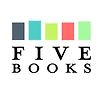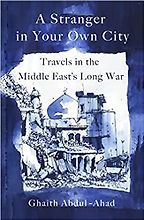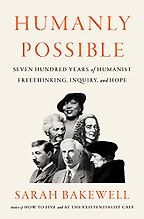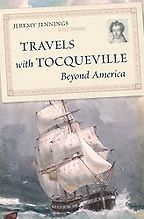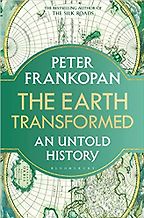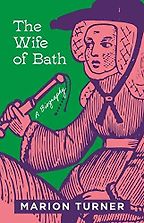It’s January. It’s dark and muddy outside and maybe I’m not the only one in the northern hemisphere feeling a little blue. Reading has certainly helped. I’m continually surprised at the number of books coming out on important or interesting subjects, particularly from university presses. I’ve looked at books on everything from the Scythians—who roamed Eurasia 2.7 millennia ago on horseback—to one on North Korea’s nuclear programme, which opens with a nuclear test lowering a mountain by half a metre. In these early months of 2023, books on intellectual history—not so much about the ideas, but the thinkers who had the ideas—have been particularly prominent. I also came across quite a few mental health and self-help books, perhaps a reflection of the time of year.
As usual, the books I’ve chosen reflect my personal interests, which tend to be quite global. Also, the books shown at the top of this interview are just a sample of the most widely accessible or ‘popular’: there are several books I mention in the text that I thought were just as interesting but are possibly for more specialized readers. Important note: once books have been published, free Kindle samples—which you can read on your computer or phone even if you don’t own a Kindle—are the best way of assessing if this is a book for you or not.
A Stranger in Your Own City by Ghaith Abdul-Ahad
This March is the 20th anniversary of the US invasion of Iraq. There is never going to be a clear figure of how many people died as a result of that catastrophic foreign policy decision, but it’s in the hundreds of thousands. A Stranger in Your Own City by Ghaith Abdul-Ahad is a beautiful book which tells that story from the point of view of a local resident, an architect, who later ended up working for foreign media, first as a fixer and then as a photographer and writer. The book opens with a chapter on “My First War”—about the Iran-Iraq war, talks about the years of sanctions, and then goes through everything that happened from 2003 up to the present. I couldn’t put it down. It’s like having a friend telling you what they lived through and finally being able to understand what happened and why things went so wrong. The chapters are short and manageable and the book includes his watercolours and line drawings (in an early chapter he references his Tintin books, always a good sign). Another important thing about this book: in spite of the awful subject matter, every now and then it’s very, very funny.
Abdul-Ahad is scathing about foreign journalists’ crass approach to Sunni and Shia identities in Iraq in the wake of the invasion, so if that’s something you want to understand more fully, you may also want to look at The Caliph and the Imam: The Making of Sunnism and Shiism. It’s a global history of Sunni-Shia relations by Toby Matthiesen, a Middle East specialist at the University of Oxford.
Humanly Possible by Sarah Bakewell
When I first heard about ‘humanism’ at school, I remember only that it was connected with a person called Erasmus (1466-1536), who lived in Rotterdam. Later, when I interviewed Andrew Copson, the CEO of Humanists UK, about humanism, I gathered it could also mean a non-bleak/more positive approach to atheism. I’m not the only one confused. As Sarah Bakewell puts it at the beginning of Humanly Possible, “it all seems gently foggy.” The book tries to trace the evolution of humanist thinking over 700 years. The book starts in 1300, though the philosophy of Brhaspati (who inspired “the first text to understand human life non-supernaturally” in the 6th century BCE) and Democritus also make an appearance. It’s a wonderful gallop through the lives and ideas of dozens of interesting thinkers and writers, including Michel de Montaigne, the subject of a previous book by Bakewell and coiner of the word “essay” (from essais—meaning try outs or attempts). By the end, the word ‘humanism’ is still not quite in focus, but I feel more comfortable with the bleariness: it makes sense that we all have our own opinions about why we’re here and what we should do with our brief lives.
Another book that clarifies an ‘ism’ is The Invention of Marxism by Professor Christina Morina, a historian at the University of Bielefeld. Translated from German, it’s a “search for the origins of Marxism,” which looks at the biographies of nine 19th-century individuals, including Lenin and Rosa Luxemburg as well as (to me) lesser-known figures. By doing so, it helps shed light on how Karl Marx—a penniless German philosopher who lived in exile in London—came to be what she calls the “(unintended) godfather of one of the most destructive social experiments in human history.”
Travels with Tocqueville Beyond America by Jeremy Jennings
If there’s a book I enjoyed for personal reasons, it’s Travels with Tocqueville Beyond America by Jeremy Jennings, a political theorist at King’s College London. Tocqueville’s book on the French Revolution was the bane of my life during my undergraduate degree in history at Oxford where, week after week in our first term, we had to analyze passages from it in what were known as ‘gobbets.’ Taking refuge in bad behaviour, my tutorial partner and I would compete in reading out passages in terrible, slow French, trying to delay the inevitable moment when we had to say something about it.
I had no idea at the time who Alexis de Tocqueville was, but after I set up Five Books with some friends in 2009, he came back into my life in a big way: Tocqueville’s books were recommended by George Bush’s chief of staff Karl Rove, eminent historian Lynn Hunter, political scientist Francis Fukuyama and even a US Supreme Court Justice, Stephen Breyer.
Five Books interviews are expensive to produce. If you're enjoying this interview, please support us by donating a small amount.
It turns out that Tocqueville was a person after my heart. He travelled a great deal, wanting to understand other countries, how they worked, and what he could learn from them. He even liked learning languages, as I do. The book takes us through his trip to the United States (age 19), the basis of his book, Democracy in America, as well as his less-known trips to Algeria, Italy, England and Ireland. Even on his honeymoon to Switzerland, Tocqueville found time to analyse the local system of government, expressing a “lofty disdain for the federal constitution of Switzerland” which he felt was “the most lax, powerless, blundering and incapable that one could imagine.” Given how smoothly Switzerland functions today, it’s quite funny; his mistakes on Algeria less so.
This is a book which makes heavy use of primary sources, i.e. you are constantly reading about Tocqueville in his own voice. I love this as a narrative technique, but if you’re interested in Tocqueville and want more of a biography, The Man Who Understood Democracy: The Life of Alexis de Tocqueville (2022) by Olivier Zunz is an alternative.
The Earth Transformed: An Untold History by Peter Frankopan
One thing that’s great about history books at the moment is the burgeoning of the world history genre. History as learned at school is traditionally national history, taught to create good, patriotic citizens, not understand the story of humanity. Peter Frankopan is a professor of global history at the University of Oxford who already took a much broader approach in his bestselling book, The Silk Roads. His latest, The Earth Transformed: An Untold History, takes an even wider approach, telling the whole of human history through the lens of the natural world. As you would expect from a book that covers several millennia, The Earth Transformed is long (650 pages), but Frankopan is an excellent writer so it’s easy to read. You can dip into the chapters and periods that particularly interest you (e.g. “The Medieval Warm Period c900-c1250”). Not surprisingly, given it’s about climate change (past, not future), science inevitably plays a big role in the book. As you’re reading it, Frankopan makes you aware of how much advances in science (including data science) can contribute to understanding history in general.
New books on the Soviet Union and China
There are at least two new books out related to the Soviet Union. The story of its collapse has come to the forefront again as we try to understand Russia’s 2022 invasion of Ukraine. “What came to an end was not history itself, but an empire whose time had run out,” writes Karl Schlögel, the German historian, in his newly translated book, The Soviet Century. Schlögel first visited the Soviet Union in 1966 and has travelled all around. It’s a quirky book, a huge and highly knowledgeable catalogue of the Soviet Union’s various parts—from flea markets to the gulag at Kolyma.
There’s also an interesting and readable new biography of George Kennan (1904-2005)—the American diplomat who was the brains behind the ‘containment’ policy towards the Soviet Union after World War II. Kennan was a Russophile—he cried while watching The Cherry Orchard and hoped to write a biography of Chekhov. He was in Moscow amidst the enormous optimism about US-Soviet relations in 1934, when Stalin kissed the US ambassador on the lips. That soon fell apart and Kennan was again in Moscow during Stalin’s show trials, translating most of the trial transcripts in 1937. Some of those executed were friends and he was emotionally devastated. “The effect was never to leave me,” he wrote. According to biographer Frank Costigliola, while Kennan advocated containment in 1946-7, he spent most of his subsequent life criticizing it, but the American foreign policy establishment didn’t want to know.
If you’re interested in China, a new book to read is Red Memory by Tania Branigan, a journalist for the Guardian. It’s about the Cultural Revolution (1966-76) and when or if the Chinese people can come to terms with the terrible things that happened. As many as two million people were killed and a further 36 million hounded, largely on the basis of ‘thoughtcrimes.’ The book explains what the Cultural Revolution was while mixing in personal stories and its relevance to current Chinese politics. As Branigan writes, “It is impossible to understand China today without understanding the Cultural Revolution….In some regards it echoes Stalinist purges, but with enthusiastic mass participation.”
The Wife of Bath: A Biography by Marion Turner
When it comes to books, medieval women have been getting lots of attention recently; what’s unusual about The Wife of Bath is that it’s about a fictional character, Alison of Bath. The book is by Marion Turner, a professor of English literature at Oxford, whose excellent biography of Chaucer was shortlisted for the Wolfson History Prize. Alison, as you may know, is a character in Geoffrey Chaucer’s The Canterbury Tales. She famously introduces herself in the prologue by saying she’s been married five times (the first time at age 12). If you haven’t read The Canterbury Tales you may find this book quite hard to follow and it’s probably worth reading The Wife of Bath’s Prologue and Tale quickly first. (It’s short, entertaining and available in modern English).
The first half of The Wife of Bath: A Biography uses Chaucer’s text to explore various aspects of the lives of/attitudes to medieval women. The second half looks at Alison’s afterlife, from the early scribes who responded to her story as they copied it out to Zadie Smith’s 2021 play. The book is very focused on the text, so it’s probably going to appeal more to people who enjoy literary analysis. If you’re looking for a historian’s approach to the lives of medieval women, Femina by Janina Ramirez is another good option.
Part of our best books of 2023 series
Five Books aims to keep its book recommendations and interviews up to date. If you are the interviewee and would like to update your choice of books (or even just what you say about them) please email us at [email protected]

